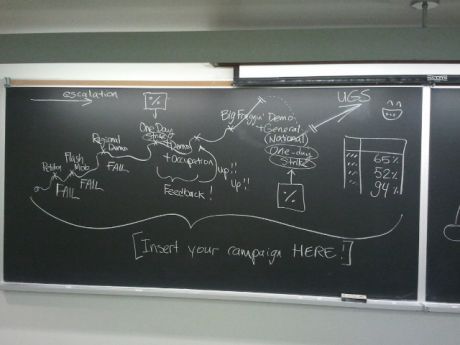News
You are here
Student Strike Training Camp Brings Lessons Of Quebec To Ontario

July 28, 2012
The University of Toronto played host to an incredible conference the weekend of July 27-29. The Ontario Student Strike Training Camp, organized by the Graduate Students’ Union, brought together activists from Montreal, Toronto, London, Ottawa, Sudbury, Guelph, New Brunswick, Hamilton and many places in between to learn how the students of Quebec organized a massive general strike against tuition fee increases.
Noticeably absent from the facilitators’ perspective was the assertion that province-wide organizations such as the CFS can simply “push the strike button” and call strike votes for all of Ontario, something that is not realistic or even possible. Instead the weekend held very serious discussion and debate about practical ways to build the student movement outside Quebec and mobilize students to transform their campuses.
There was an incredible breadth of sessions, covering a number of themes, from getting the word out to enforcing a strike. However, a few clear themes emerged throughout the weekend that are worth repeating and generalizing.
First of all, workshop facilitators emphasized the need to find issues that mobilize students. This means starting from a broad basis of unity, while putting forth an argument that can start a debate that will mobilize students. Emphasizing realistic goals rather than revolutionary slogans may seem too “reformist” at first, but student’ ideas can be transformed in the struggle of fighting for those goals, leading to more radical positions and actions. Through the process of tactics such as pickets, flashmobs and demonstrations, the level of struggle can quickly escalate.
Actions should always be thought of in the context of drawing more people into the movement. For instance, how can we use a petition or leaflet to get more people involved, start more conversations and expand the number of people working on this project? Can we use direct actions such as occupations and demonstrations to raise the profile of the movement and the confidence of students, involving broader layers of the campus?
Furthermore, presenters emphasized the need to include other sectors of society in the struggle. If the movement only speaks for students, its appeal will end there. We need to be connecting the student movement to workers facing austerity, people who cannot afford post-secondary education, racially marginalized people and beyond.
Presenters emphasized the need to organize at the departmental level, rather than campus-wide. Doing this ensures greater participation and more direct democracy. Start with departments that are most open to arguments against increasing fees, and avoid organizing huge general assemblies that can be more easily overwhelmed by organized forces hostile to a progressive student movement. By organizing these friendly departments first, stronger departments can go on strike and empower other departments to join as well.
These stronger departments can strike first to create momentum and pressure other campuses to do the same. However, they should not be isolated. Often times strike votes happened a year before they were acted on because they required strike votes from a certain number of other campuses. For instance, a strike mandate could require seven other departments, 20,000 students and three other campuses to go on strike first. For a strike to be effective, the strike must be enforced. Picket lines to stop classes from happening are a must.
One lesson that bears repeating is that a strike is a tactic for achieving a goal. If we focus on the strike as the end-goal, we risk alienating students not ready to strike right away. The legitimacy of a strike comes from the prior mobilization which has involved as many people as possible in the General Assemblies (GAs) and the voting. Imposing radical demands from the top-down without adequate mobilization will not make for a strong strike; voting on a strike or imposing a strike will not be effective if it cannot be carried by the rank-and-file students. Strikes don’t appear out of thin air, but they are not impossible. They involve engaging with fellow students and expanding the participation in campus politics.
As one Montreal facilitator put it, “you should never be too prudent to act, but you should never be too confident to cause chaos without a mandate.” Mobilize your department, listen to the GAs and take action. What appears as apathy can turn to radicalism quickly, but it will require some serious work.
Section:
- Log in to post comments










